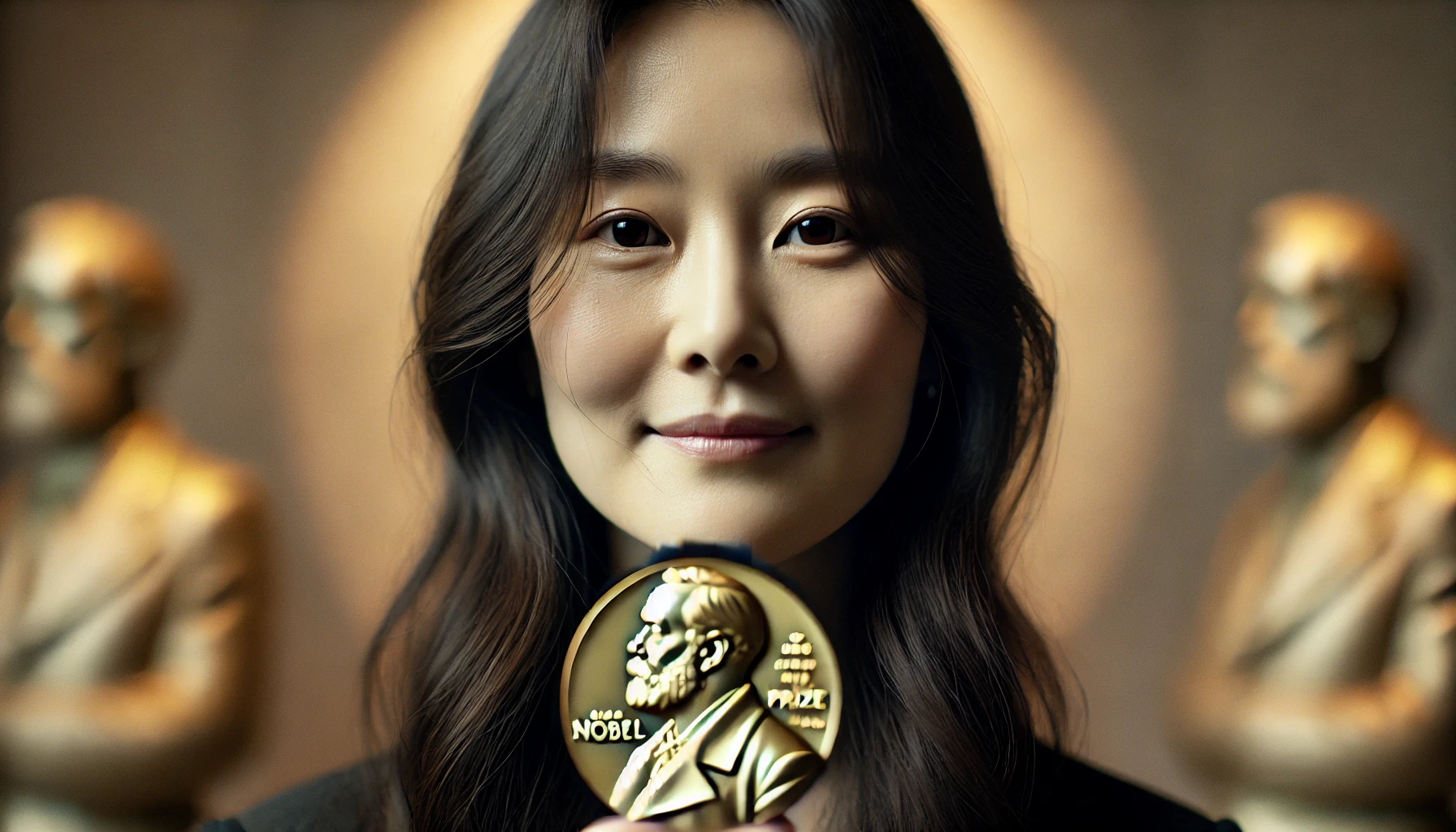On October 10, 2024, South Korean author Han Kang won the Nobel Prize in Literature, marking a historic moment as she became the first person from her country to receive this prestigious honor. The Nobel committee awarded her for “intense poetic prose that confronts historical traumas and exposes the fragility of human life.” Han, who is widely recognized for her novel The Vegetarian, was surprised by the news. Mats Malm, the permanent secretary of the Swedish Academy, shared that “she wasn’t really prepared for this,” and described how they interrupted her during an ordinary day to inform her of the award.
A Legacy of Powerful, Unflinching Works
Han Kang, 53, was born in Gwangju, South Korea, a city known for its 1980 pro-democracy uprising where government forces killed hundreds of civilians. This tragedy deeply influenced Han, who later used it as inspiration for her novel Human Acts. Her writing often explores dark themes, such as violence, grief, and historical traumas, challenging readers to confront difficult aspects of human nature.
Han’s debut work in fiction, a short story collection titled The Love of Yeosu, was published in 1995. Over the years, she continued to produce thought-provoking novels that delve into complex emotional landscapes. Her 2007 novel, The Vegetarian, became a major success after being translated into English in 2015. It tells the story of a woman named Yeong-hye who, in a society that views her actions as abnormal, decides to stop eating meat. This choice spirals into a surreal and disturbing journey, as her transformation impacts her family in unexpected ways. The book won the Man Booker International Prize in 2016 and propelled Han into the international spotlight.
Her other works include The White Book, a novel reflecting on mourning and the fragility of life, and Greek Lessons, published in English in 2023, which portrays a woman losing her voice and her struggle to reclaim it by learning ancient Greek. Another upcoming novel, We Do Not Part, is set to release in the U.S. in January.
Impact on Korean Literature and Society
Han’s win is a significant milestone for Korean literature, which has long sought recognition on the world stage. President Yoon Suk Yeol called the win “a great achievement for South Korean literature and an occasion for national celebration.” Paige Aniyah Morris, a translator of Han’s work, said, “Han’s work has inspired a generation of Korean writers to be more truthful and more daring in their subject matter.”
Her novels often reflect Korean society and its painful historical events. For example, Human Acts focuses on the Gwangju Uprising, detailing the brutality of that time through the perspectives of multiple characters. In a 2016 interview, Han spoke about how these themes resonate deeply with her, sharing that she often returns to the question of “what it means to be human” in her writing.

Han’s writing style is often described as poetic and experimental. Anders Olsson, the chair of the Nobel Prize committee, praised her for “confronting historical traumas and invisible sets of rules,” and described her as “an innovator in contemporary prose.” Her work examines the body and soul, the living and the dead, and pushes the boundaries of traditional narrative forms.
A Journey to Global Recognition
Despite her current success, Han’s path to literary fame was gradual. Her first published works in the early 1990s were poems, and she didn’t gain international recognition until The Vegetarian was translated into English. Since then, her works have been translated into more than 30 languages, and she has become a symbol of the growing influence of Korean literature globally.
In recent years, the Nobel Prize in Literature has received criticism for favoring European and North American authors, leading the committee to consider more diverse backgrounds and perspectives. Han is only the 18th woman to win the Nobel Prize in Literature since it was first awarded in 1901, and her success is seen as a step forward in addressing the prize’s historical lack of diversity.
For many in South Korea, her win is more than just a personal achievement. Korean literature has long been dominated by male writers, and Han’s success is a signal of change, reflecting the voices of women who are increasingly challenging social norms and exploring difficult subjects like patriarchy, misogyny, and societal expectations.
As the news spread, celebrations erupted across South Korea, with many expressing pride in seeing one of their own achieve such global recognition. For Korean writers and readers, Han’s Nobel Prize win is a source of hope and inspiration, symbolizing a new era for Korean literature on the world stage.
Han will receive her award at a ceremony in December, where she will join past laureates like Toni Morrison, Kazuo Ishiguro, and Bob Dylan. Along with the honor, she will receive 11 million Swedish krona, which is approximately $1 million.
This article is based on the following articles:
https://www.washingtonpost.com/books/2024/10/10/nobel-prize-literature-han-kang-2024
https://www.bbc.com/news/articles/c206djljel1o
https://www.dw.com/en/south-korean-han-kang-wins-nobel-prize-for-literature-2024/a-70452211
https://www.nytimes.com/2024/10/10/arts/nobel-prize-literature.html

Background Information
1. The Nobel Prize in Literature
The Nobel Prize in Literature is one of the most prestigious awards given each year to an author for their body of work. It was established by Alfred Nobel, a Swedish chemist, engineer, and inventor of dynamite, who left his fortune to create the Nobel Prizes. The award has been given out since 1901 and is decided by the Swedish Academy. The winner receives a medal, a diploma, and a monetary award. The prize is meant to honor writers who have made a significant impact on the world of literature, whether through novels, poetry, or other forms of writing.
The Nobel Prize in Literature often goes to writers whose works deal with important social issues or explore deep themes about human life. It is not just about one book but about the entire body of work the author has produced. This prize has been awarded to famous authors like Gabriel García Márquez, Toni Morrison, and Bob Dylan. It is highly respected, and winning it usually brings the author more international recognition and increases interest in their books.
2. Han Kang and Her Writing Style
Han Kang is a South Korean author who has been writing for many years, but she became well-known internationally after her novel The Vegetarian was translated into English. Her writing is often described as poetic and intense, and she explores themes like human emotions, trauma, and suffering. She has written about difficult topics, such as historical events that have impacted South Korea. Her style often combines reality with surreal or dream-like elements, creating stories that are imaginative and thought-provoking.
3. South Korea and the Gwangju Uprising
South Korea is a country in East Asia, known for its rich culture, technology, and entertainment industries. It has a unique history, having been divided into North Korea and South Korea after World War II. The country has experienced rapid economic growth, but it has also faced difficult times, such as the Korean War and periods of political unrest.
One significant event in South Korea’s history is the Gwangju Uprising, which took place in 1980. During this time, citizens in the city of Gwangju protested against the government for democracy and human rights. The government responded with military force, resulting in many deaths. This event had a lasting impact on South Korea and has been a topic in literature, film, and other art forms. Han Kang’s novel Human Acts explores the Gwangju Uprising and its effects on individuals and society.
4. Korean Literature and its Global Influence
Korean literature has gained more attention worldwide in recent years. Historically, it has been deeply influenced by the country’s unique culture and turbulent history. Korean literature often includes themes of resilience, family, and social issues, and it has become more recognized internationally due to works being translated into different languages. Female writers in South Korea are increasingly exploring topics like gender, society, and personal freedom, which were once considered taboo or less common in Korean literature.
Authors like Han Kang have helped to bring Korean literature into the global spotlight. Her success has also encouraged more translation of Korean works, allowing readers around the world to access and appreciate stories from South Korea. This cultural exchange helps people understand different perspectives and contributes to the growing popularity of Korean literature worldwide.
These elements provide context for why Han Kang’s Nobel Prize win is significant, not only for her as an individual but also for South Korean literature and its place in the global literary community.
Please subscribe to Insight Fortnight, our biweekly newsletter!
